#cloud-based-pos-solution
Explore tagged Tumblr posts
Text
#retail pos solutions#erp for retail business#cloud retail erp software#retail pos software#retail pos system software#cloud it solutions#cloud based erp solutions#erp software solutions#business software solutions#software solutions company#Field Service Management Solution#erp for small business#cloud erp#erp implementation#erpcompany#erpdevelopment#canada#erpsolutions#sap erp#erp#erp software
2 notes
·
View notes
Text
youtube
Hotel Management Software in Bangladesh | Hotel Management System & Booking Software
#Hotel Reservation System#Hotel Management Software#Hotel Software Solutions#Hospitality Management#Front Desk Software#Hotel Automation#Hotel Business Solutions#Hotel Software Demo#Hotel Industry#Hotel Booking Software#Hotel Inventory Management#Hotel POS#Cloud Based Hotel Software#Hotel Check In System#Hotel ERP#Youtube
0 notes
Text
Welcome to NamasteNet: Your Trusted Partner in Web Design and POS Software Solutions

At NamasteNet, we believe in the power of digital transformation for businesses of all sizes. Located in the heart of Hyderabad, we specialize in providing affordable web design and POS software solutions tailored specifically for Indian startups and small businesses.
Affordable Web Design That Elevates Your Business
NamasteNet offers custom website design services starting at just ₹4,999, making high-quality web design accessible to all. We don’t just build websites—we create digital experiences that reflect your brand's unique identity. Whether you're an emerging startup or an established business, our team ensures that your online presence stands out and delivers a seamless experience across all devices.
With a focus on responsive web design, we ensure that your website looks stunning whether viewed on a desktop, tablet, or smartphone. In today's mobile-first world, responsive design isn't just a feature—it's a necessity. And with our SEO-optimized websites, your business will not only look great but also rank higher in search engine results, driving organic traffic to your site.
Revolutionary POS Software to Streamline Your Operations
NamasteNet offers POS software starting at just ₹3,999, designed to streamline sales processes, enhance inventory management, and provide real-time business insights. Our cloud-based POS solutions are built to help retail stores, restaurants, and pharmacies run efficiently, without the hassle of paperwork or manual tracking.
Whether you’re a retailer in need of a reliable retail POS system or a restaurant seeking to improve customer service with a restaurant POS solution, NamasteNet’s software provides easy-to-use interfaces and robust functionality. With features like real-time sales tracking and inventory management, our POS systems will save you time and boost your bottom line.
Why NamasteNet?
NamasteNet prides itself on delivering Made-in-India solutions under the Digital India initiative. Our local expertise and understanding of the Indian market allow us to craft products that are not only affordable but highly effective for Indian businesses. We’re committed to supporting the growth of businesses with our affordable digital solutions that cater specifically to their needs.
Your Success is Our Success
We don’t just stop at providing the technology. The NamasteNet team is dedicated to offering unparalleled customer support and assistance every step of the way. Whether you need a complete digital overhaul or just a single service, we are here to help your business thrive in the digital age.
For businesses looking for an all-in-one solution to both their web design and POS software needs, NamasteNet is the partner you can trust. With affordable pricing and tailored solutions, we help businesses unlock their full digital potential.
Contact us today to learn more:
📞 +91 905 905 4355 📧 [email protected] 🏢 16-11-220, East Prasanth Nagar, Moosarambagh, Hyderabad - 500036
#Web Development Company Hyderabad#Best Web Designers Hyderabad#Top Web Development Companies Hyderabad#Affordable Web Design Services Hyderabad#Custom Website Design Hyderabad#E-commerce Website Development Hyderabad#Mobile App Development Hyderabad#SEO Services Hyderabad#Digital Marketing Company Hyderabad#Responsive Web Design Hyderabad#Retail POS Software Hyderabad#POS Billing Software Hyderabad#Best POS Software for Retail Stores Hyderabad#Cloud-based POS Solutions Hyderabad#Affordable POS Software Hyderabad#POS Software with Inventory Management Hyderabad#GST Billing Software Hyderabad#Mobile POS Systems Hyderabad#Made-in-India Software#Digital India Initiative.
0 notes
Text
Best Cafeteria/Restaurant Point of Sale software in UAE 2024
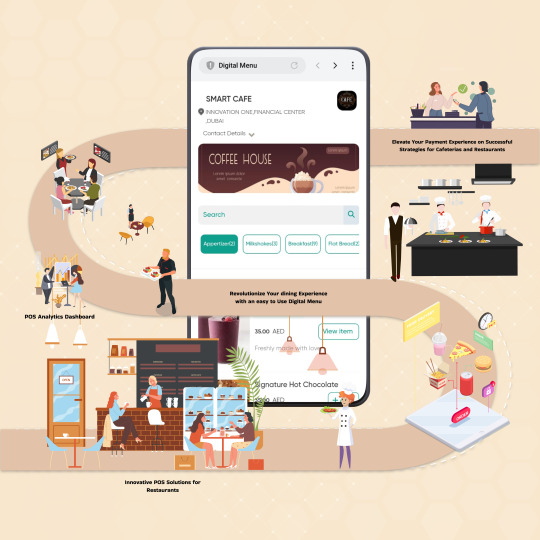
POS providers offer various features and functionalities to meet the diverse needs of cafes and restaurants in the UAE, helping businesses streamline operations, improve service efficiency, and enhance customer experiences.
What is Restaurant/Cafeteria POS Software?
Restaurant and cafeteria POS (Point of Sale) software is a vital tool that streamlines the operations of hospitality service establishments. This specialized software facilitates the efficient management of transactions, inventory, and customer interactions, transforming how restaurants and cafeterias handle their day-to-day activities.
Read more..
#uae#software#restaurant pos software dubai#cloud based pos solutions#kitchen pos system#table management system#restaurant table management#restaurant digital menu app#qr code menu ordering#restaurant pos uae#cafe pos system in abu dhabi
0 notes
Text
Discover the pivotal role of POS (Point of Sale) software in revolutionizing customer experiences at restaurants. Explore how advanced POS solutions streamline ordering, improve service efficiency, and personalize interactions, ultimately elevating overall satisfaction. Unlock the potential of POS software to create memorable dining experiences for your patrons today!Restaurant Billing Software
#restaurant management software#restaurant management system#restaurant software#restaurant pos system#restaurant pos software#pos software#onlineemenu#advanced POS solutions#Cloud Based POS Software#Restaurant Billing Software
0 notes
Text
POS (Point of Sale) machines quiz
What does the acronym "POS" stand for in the context of retail and commerce?
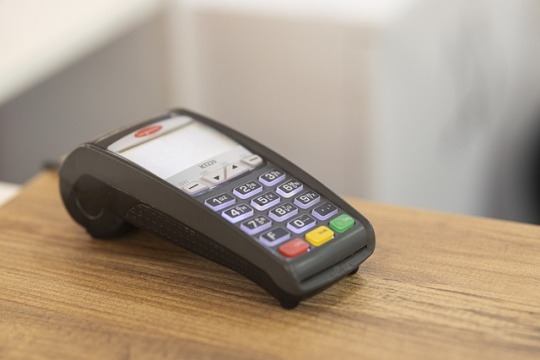
Follow if you are an entrepreneur at heart!!
#What does the acronym “POS” stand for in the context of retail and commerce?#POS (Point of Sale) machines quiz#point of sale#point of sale software#point of sales system#best point of sale#point of sale system#the best point of sale#point of sale solution#free point of sale#best point of sale system#restaurant point of sale#retail point of sale#tablet point of sale#what is a point of sale#android point of sale#point of sale software for retail businesses#point of sale (software genre)#cloud based point of sale software#mobile pos machine#business point#right from the start#ecommerce#washington state department of early learning#family support center of south sound#washington state correctional industries#omnichannel retail#early learning and a healthy community#content management solution#content marketing
1 note
·
View note
Text
The Evolution of POS Systems for Businesses: From Cash Registers to Cloud-Based POS Solutions
Point of Sale (POS) systems have come a long way from the days of manual cash registers and handwritten receipts. Over the years, the evolution of POS systems has transformed the way businesses operate, improving efficiency, accuracy, and customer service. In this blog post, we'll take a journey through the history of POS systems, highlighting the key milestones and technological advancements that have shaped their development.
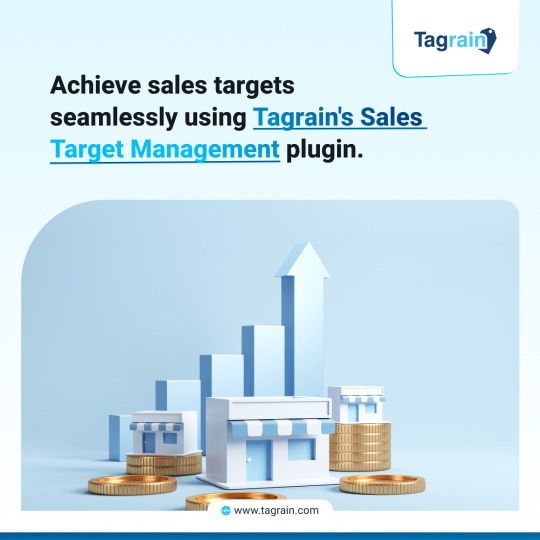
The Humble Beginnings of Cash Registers
The story of POS system begins in the late 19th century with the invention of the cash register by James Ritty and John Birch. These early devices were designed to prevent employee theft and record sales transactions. They featured a simple mechanism for ringing up sales and producing a paper receipt. While rudimentary by today's standards, cash registers marked the first step toward automating sales and inventory tracking.
The Rise of Electronic Cash Registers
In the mid-20th century, electronic cash registers emerged as a significant improvement over their mechanical counterparts. These machines could calculate totals more quickly and accurately, making them a valuable tool for businesses. However, they were still limited in their functionality, primarily serving as a means to record sales.
The Advent of Computer-Based POS System
The 1980s saw a major leap in POS technology with the introduction of computer-based systems. These systems incorporated desktop computers and specialized software to manage inventory, track sales, and generate reports. Businesses could now leverage digital technology to gain insights into their operations, helping them make more informed decisions.
The Transition to Touchscreen POS Softwares
In the late 20th century, touchscreen technology revolutionized the POS industry. Touchscreen terminals allowed for more intuitive and efficient order processing. This advancement streamlined the checkout process, reduced errors, and enhanced the customer experience. Moreover, touchscreen systems could be customized to accommodate various industries, from retail and restaurants to hospitality and healthcare.
Mobility and Cloud-Based Solutions
The 21st century brought a new wave of innovation to retail POS system. Mobile devices, such as tablets and smartphones, became integral to the POS landscape. Small businesses and pop-up shops could now adopt affordable mobile POS systems that offered flexibility and scalability. Furthermore, the advent of cloud-based POS solutions enabled businesses to access their data remotely, providing real-time insights into sales, inventory, and customer preferences.
Integration and Analytics
Modern POS systems have become more than just transaction-processing tools. They now offer seamless integration with other business software, such as accounting, inventory management, and customer relationship management (CRM) systems. This integration allows for a holistic view of business operations and improves data accuracy.
Additionally, POS systems have evolved to provide advanced analytics and reporting features. Businesses can analyze sales trends, customer behavior, and inventory turnover to make data-driven decisions that drive growth.
Contactless Payments and Enhanced Security
In response to changing consumer preferences and security concerns, POS systems have adopted contactless payment options, including NFC (Near Field Communication) and mobile wallet payments. These features have become crucial during the COVID-19 pandemic, as customers seek touch-free payment methods.
Moreover, POS systems have enhanced security measures to protect sensitive customer data. Features like end-to-end encryption and tokenization help businesses maintain PCI DSS compliance and safeguard customer information.
Conclusion
The evolution of POS systems for businesses has been a remarkable journey marked by technological advancements that have transformed the way transactions are processed and business operations are managed. From basic cash registers to modern, cloud-based solutions, POS systems have become essential tools for businesses of all sizes and industries.
As technology continues to advance, we can expect POS systems to evolve even further, offering more personalized customer experiences, greater automation, and deeper insights into business operations. With the ever-changing landscape of commerce, businesses that embrace these advancements will be better positioned to thrive in the digital age.
1 note
·
View note
Text
Harmonized retail components for holistic omnichannel transformation and hyper local proximity delivery. Anything Retail with a customization factor of 20% required as no one size fits all. Unlock your Effortless Digital first strategy through our Cloud based E-commerce Solutions.
#omnichannel software#omni channel#Retail software SAAS#Retail pos software#Omnichannel Retail#Cloud based E-commerce Solution
1 note
·
View note
Text
Boost Retail Efficiency with ConnectPOS
A POS system is vital for contemporary retail, streamlining functions and improving consumer experiences. ConnectPOS sticks out along with its flexible cloud-based solutions, seamlessly incorporating along with platforms like Shopify POS, Magento POS, BigCommerce POS, WooCommerce POS, NetSuite POS, and Commercetools POS. Whether you need to have Standalone POS, White label POS, Apparel POS, Furnishings Outlet POS, or even Food Store POS, ConnectPOS has you covered.
2 notes
·
View notes
Text
The Future of ERP Software in India: Trends to Watch in 2024
As India continues to solidify its position as a global economic powerhouse, the demand for sophisticated Enterprise Resource Planning (ERP) solutions has never been higher. ERP software companies in India are at the forefront of this transformation, driving innovation and efficiency across various industries. As we look ahead to 2024, several key trends are shaping the future of ERP software in India. This blog delves into these trends, offering insights into how ERP software providers in India are gearing up to meet the evolving needs of businesses.
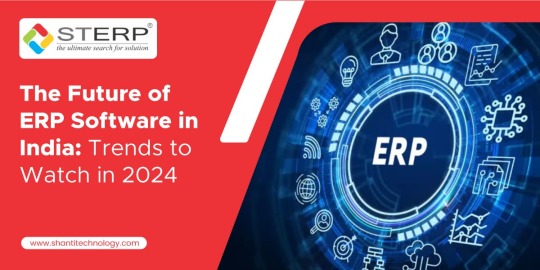
1. Increased Adoption of Cloud-Based ERP Solutions
One of the most significant trends in the ERP landscape is the shift towards cloud-based solutions. ERP software companies in India are increasingly offering cloud-based ERP systems to meet the growing demand for flexibility, scalability, and cost-efficiency. Cloud ERP solutions eliminate the need for extensive on-premises infrastructure, allowing businesses to reduce capital expenditure and streamline operations.
Cloud-based ERP systems also facilitate real-time data access and collaboration, enabling businesses to make informed decisions quickly. This trend is particularly beneficial for small and medium-sized enterprises (SMEs) that require affordable and scalable ERP solutions to compete effectively in the market.
2. Integration of Artificial Intelligence and Machine Learning
Artificial Intelligence (AI) and Machine Learning (ML) are revolutionizing the ERP landscape. ERP software providers in India are integrating AI and ML technologies to enhance the capabilities of their solutions. These technologies enable predictive analytics, automate routine tasks, and provide intelligent insights, helping businesses to optimize their operations.
For instance, AI-powered ERP systems can forecast demand, manage inventory levels, and predict maintenance needs, significantly improving efficiency and reducing costs. As AI and ML technologies continue to evolve, their integration into ERP systems will become more sophisticated, offering even greater value to businesses.
3. Focus on Industry-Specific ERP Solutions
ERP software companies in India are increasingly developing industry-specific ERP solutions to cater to the unique needs of different sectors. Whether it is manufacturing, retail, healthcare, or finance, each industry has distinct requirements that generic ERP systems might not fully address. Industry-specific ERP solutions offer tailored functionalities and workflows, ensuring better alignment with business processes.
For example, a manufacturing ERP system might include features for production planning, quality control, and supply chain management, while a retail ERP system could focus on inventory management, point of sale (POS) integration, and customer relationship management (CRM). This trend towards specialization ensures that businesses can leverage ERP systems that truly support their operational needs.
4. Enhanced Mobile Accessibility
With the proliferation of smartphones and mobile devices, the need for mobile-friendly ERP solutions is growing. ERP software providers in India are developing mobile applications that allow users to access critical business information on the go. Mobile ERP solutions enable employees to perform tasks such as inventory checks, sales order processing, and expense reporting from their smartphones or tablets.
This trend not only improves accessibility but also enhances productivity by enabling employees to work remotely and make decisions in real-time. As mobile technology continues to advance, the functionality and user experience of mobile ERP applications will improve, making them an indispensable tool for modern businesses.
5. Increased Emphasis on Data Security and Compliance
As businesses become more reliant on digital technologies, data security and compliance have become paramount. ERP software providers in India are prioritizing data protection by incorporating advanced security features into their solutions. This includes encryption, multi-factor authentication, and regular security audits to safeguard sensitive business information.
Moreover, with the implementation of regulations such as the General Data Protection Regulation (GDPR) and India’s Personal Data Protection Bill, compliance is a critical concern for businesses. ERP software providers are ensuring that their systems comply with these regulations, helping businesses avoid legal penalties and build trust with their customers.
6. Rise of Hybrid ERP Solutions
While cloud-based ERP systems offer numerous advantages, some businesses prefer on-premises solutions due to specific regulatory or operational requirements. To cater to these diverse needs, ERP software companies in India are offering hybrid ERP solutions that combine the benefits of both cloud and on-premises systems.
Hybrid ERP solutions provide the flexibility of cloud-based systems while allowing businesses to maintain critical applications on-premises. This approach offers a balanced solution, enabling businesses to optimize their IT infrastructure based on their unique needs and preferences.
7. Adoption of Advanced Analytics and Business Intelligence
Data is the new currency in today’s business environment, and the ability to harness and analyze data is a key competitive advantage. ERP software providers in India are integrating advanced analytics and business intelligence (BI) tools into their systems. These tools enable businesses to gain deep insights into their operations, identify trends, and make data-driven decisions.
Advanced analytics and BI tools can analyze large volumes of data from various sources, providing comprehensive reports and dashboards. This helps businesses to monitor performance, identify inefficiencies, and uncover new opportunities for growth.
8. Greater Focus on User Experience and Interface Design
The user experience (UX) and interface design of ERP systems are critical to their adoption and effectiveness. ERP software companies in India are placing a greater emphasis on developing intuitive and user-friendly interfaces. This trend is driven by the need to ensure that ERP systems are accessible and easy to use for all employees, regardless of their technical expertise.
Modern ERP systems feature clean, responsive interfaces with customizable dashboards and navigation options. This focus on UX design helps to improve user satisfaction, reduce training time, and increase overall productivity.
9. Integration with the Internet of Things (IoT)
The Internet of Things (IoT) is transforming the way businesses operate by enabling real-time monitoring and data collection from connected devices. ERP software providers in India are integrating IoT capabilities into their systems to enhance operational efficiency and decision-making.
IoT-enabled ERP systems can monitor equipment performance, track inventory levels, and optimize supply chain operations. For example, sensors placed on manufacturing equipment can detect anomalies and trigger maintenance requests before a breakdown occurs. This integration of IoT with ERP systems allows businesses to leverage real-time data for proactive management and improved efficiency.
10. Sustainable and Green ERP Solutions
Sustainability is becoming a key consideration for businesses across industries. ERP software companies in India are developing solutions that support sustainable practices and environmental responsibility. Green ERP solutions help businesses to monitor and reduce their environmental impact by tracking energy consumption, waste management, and resource utilization.
By integrating sustainability metrics into their ERP systems, businesses can set and achieve environmental goals, comply with regulations, and enhance their corporate social responsibility (CSR) initiatives. This trend towards sustainable ERP solutions reflects the growing importance of environmental stewardship in today’s business landscape.
Conclusion
The future of ERP software in India is marked by innovation, adaptability, and a deep understanding of the unique needs of businesses. ERP software providers in India are leading the charge, offering solutions that are not only technologically advanced but also aligned with the evolving demands of the market. As we move into 2024, the trends highlighted in this blog will play a crucial role in shaping the ERP landscape, driving efficiency, and fostering growth across industries.
ERP software providers in India are well-positioned to support businesses in their digital transformation journeys, providing the tools and insights needed to thrive in a competitive environment. By staying ahead of these trends, businesses can leverage ERP solutions to achieve operational excellence and sustainable growth.
#ERP software Companies in India#ERP software providers in India#ERP software company in India#ERP software in India#ERP solution provider#ERP software#ERP system#cloud ERP#ERP solutions
4 notes
·
View notes
Text
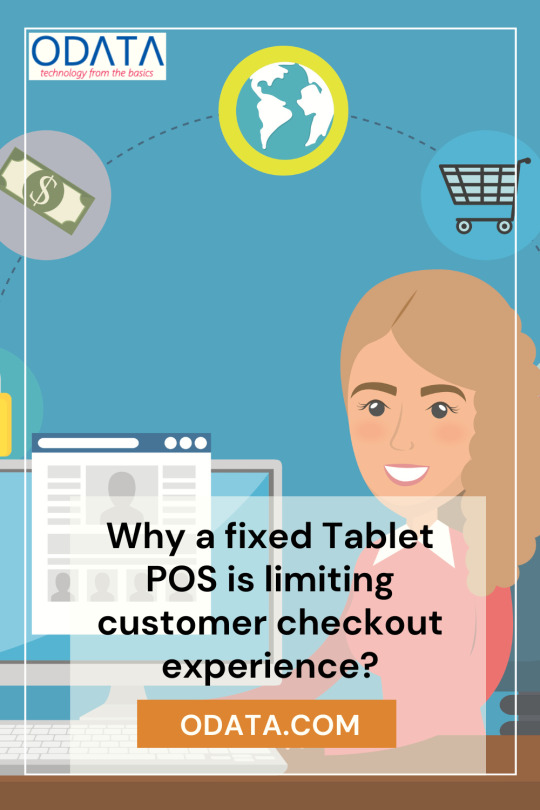
Why a fixed Tablet POS is limiting customer checkout experience
Visit us for more details - https://www.odata.com/
Are you looking for the best Retail POS system? Grow your business with Gainz Retail - A complete retail point of sale system. Odata Solution provide the business ERP with omni commerce retail solution.
#retail pos solutions#erp for retail business#cloud retail erp software#retail pos software#retail pos system software#cloud it solutions#cloud based erp solutions#erp software solutions#business software solutions#software solutions company#Field Service Management Solution#cloud erp#erp implementation#erp#erpdevelopment#erpcompany#erp software#erpsolutions#erp for small business#canada#sap erp
1 note
·
View note
Text
POS for eCommerce: Power to Boost Your Online Sales
Introduction
In today's digital era, having an efficient POS for eCommerce is essential for seamless transactions and improved customer experience.
Whether you're running an online store, a retail business, or a restaurant, a reliable POS billing system ensures hassle-free operations.
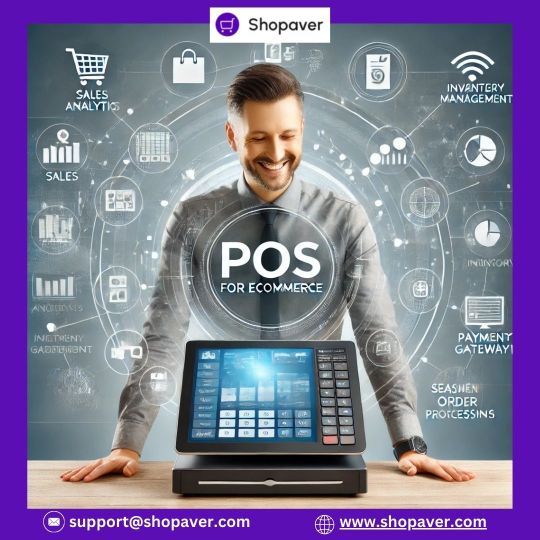
What is a POS for eCommerce? 🤔
A POS (Point of Sale) system for eCommerce is cloud-based software that integrates with your online store to manage sales, inventory, and payments efficiently.
Unlike traditional POS machines, modern online POS systems work in real-time, providing businesses with better control over transactions.
Benefits of Using an Online POS System for Retail 🏪
1️⃣ Seamless Integration: Connects with eCommerce platforms for smooth order processing.
2️. Real-time Inventory Management: Keeps stock updated across multiple channels.
3️. Multi-Payment Support: Accepts credit cards, UPI, and mobile wallets.
4️. Automated Reports & Analytics: Provides insights to improve sales.
5️. Scalability: Suitable for small and large businesses.
Best Online POS System for Your Business 🏆
Choosing the best online POS system depends on your business type:
Retail POS 🏬: Ideal for physical stores selling products.
Restaurant POS 🍽️: Perfect for food businesses with table management and billing.
Mobile POS 📱: Allows transactions on the go for pop-up stores and events.
Conclusion
A POS for eCommerce is a game-changer for businesses looking to enhance efficiency and boost sales. Whether you need a retail POS, restaurant POS, or a mobile POS, investing in the right POS solution can drive growth and improve customer satisfaction.
0 notes
Text
Your Business with NamasteNet: Hyderabad's Premier Web Development and POS Solution Experts

In today’s digital-first world, a strong online presence is non-negotiable. Whether you’re running a startup or managing an established business, having a well-crafted website and efficient point-of-sale (POS) systems can make all the difference. This is where NamasteNet comes in. Based in the heart of Hyderabad, NamasteNet is a leader in providing cutting-edge web development and POS solutions that cater to businesses of all sizes.
Why NamasteNet?
At NamasteNet, we understand that each business is unique. That’s why we specialize in delivering tailored solutions that meet your specific needs. From stunning website designs to robust POS systems, we offer a comprehensive suite of services that drive business growth.
Web Design Services That Shine
Your website is often the first point of contact with potential customers, making it crucial to leave a lasting impression. NamasteNet’s Web Design Services in Hyderabad are focused on creating visually appealing, user-friendly websites that not only look great but also perform exceptionally well.
Custom Website Design: We don’t believe in cookie-cutter solutions. Our team of creative web designers works closely with you to craft a website that truly represents your brand.
E-commerce Website Development: If you’re looking to sell products online, our e-commerce solutions are second to none. We design and develop e-commerce platforms that are secure, scalable, and easy to manage.
Mobile App Development: With more consumers accessing websites via mobile devices, having a responsive design is essential. Our mobile app development services ensure your site looks great and functions smoothly on any device.
SEO and Digital Marketing for Visibility
What’s the use of a beautiful website if it doesn’t reach your target audience? NamasteNet’s SEO Services in Hyderabad are designed to boost your online visibility and drive organic traffic to your site. Our digital marketing strategies are data-driven and tailored to meet your business goals.
SEO Optimization: We use the latest SEO techniques to ensure your website ranks high on search engine results pages (SERPs).
Content Marketing: Engaging content is key to attracting and retaining customers. Our team creates high-quality content that resonates with your audience and enhances your brand’s online presence.
POS Solutions That Streamline Operations
Efficiency is the backbone of any successful business. NamasteNet’s POS Solutions in Hyderabad are designed to streamline your operations, from inventory management to sales tracking.
Retail POS Software: Ideal for retail stores, our POS software helps you manage sales, inventory, and customer data with ease.
Restaurant POS Software: Tailored specifically for the food industry, our restaurant POS systems ensure smooth operations, from order taking to billing.
Cloud-based POS Solutions: Access your business data anytime, anywhere with our secure cloud-based POS systems.
Affordable Solutions with No Compromises
At NamasteNet, we believe that quality doesn’t have to come with a hefty price tag. Our services are competitively priced, ensuring that businesses of all sizes can access top-notch web development and POS solutions. We are proud to be part of the "Made in India" movement, contributing to the "Digital India" initiative by providing innovative, locally developed solutions.
Our Commitment to Excellence
Choosing NamasteNet means choosing a partner who is committed to your success. Our team of experts in Hyderabad is dedicated to delivering solutions that not only meet but exceed your expectations. We take the time to understand your business, offering personalized services that drive results.
Get Started with NamasteNet Today
Are you ready to take your business to the next level? Whether you need a new website, want to improve your online visibility, or are looking for efficient POS solutions, NamasteNet has you covered.
Contact Us Today: 📞 +91 905 905 4355 📧 [email protected] 🏢 16-11-220, East Prasanth Nagar, Moosarambagh, Hyderabad - 500036
Visit our website at www.NamasteNet.com to learn more about our services and how we can help your business thrive.
#Web Design Services Hyderabad#Custom Website Design Hyderabad#E-commerce Website Development Hyderabad#Mobile App Development Hyderabad#SEO Services Hyderabad#Digital Marketing Company Hyderabad#Responsive Web Design Hyderabad#Retail POS Software Hyderabad#POS Billing Software Hyderabad#Best POS Software for Retail Stores Hyderabad#Cloud-based POS Solutions Hyderabad#Restaurant POS Software Hyderabad#Pharmacy POS Systems Hyderabad#Affordable POS Software Hyderabad#POS Software with Inventory Management Hyderabad#GST Billing Software Hyderabad#Mobile POS Systems Hyderabad#Hyderabad#Secunderabad
0 notes
Text
How Restaurant Management Software Streamlines Operations and Boosts Efficiency
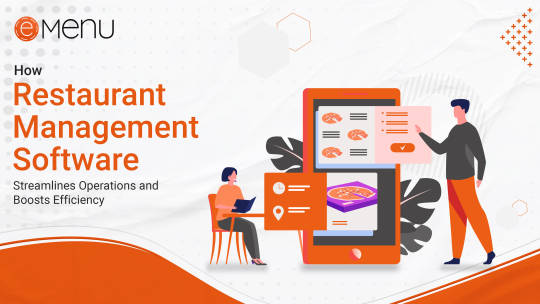
The restaurant industry is highly competitive, and efficient operations play a crucial role in the success of any establishment. In today's digital age, restaurant management software has emerged as a powerful tool to streamline operations and boost efficiency. This blog post explores the various ways in which restaurant management software revolutionizes the way restaurants operate, enabling them to deliver exceptional customer experiences while optimizing their backend processes.
The Role of Restaurant Management Software:
Online eMenu Restaurant management software is a comprehensive solution designed to handle the diverse aspects of running a restaurant. It encompasses a wide range of features and functionalities that simplify day-to-day operations, enhance productivity, and improve overall efficiency. From Restaurant tasks to Restaurant operations, the software offers a centralized platform to manage and streamline various processes.
Streamlining Restaurant Operations:
In the bustling environment of a restaurant, managing Restaurant operations efficiently is essential. Online eMenu Restaurant management software offers tools for reservation and table management software, allowing customers to book tables online and providing staff with real-time updates on reservations. This helps optimize table turnover and maximize seating capacity, leading to better customer service and increased revenue. Additionally, the software integrates with the point-of-sale (POS) system, enabling seamless order taking and processing.
Enhancing Restaurant Efficiency:
Efficiency in the Restaurant operations is equally important for smooth restaurant functioning. With restaurant management software, staff scheduling and labor management become hassle-free. The software automates scheduling, taking into account factors such as staff availability and workload, resulting in optimized staff allocation and improved productivity. It also tracks labor costs and performance metrics, providing valuable insights for effective decision-making.
Supplier and procurement management is another critical aspect that software addresses. By streamlining the ordering process and managing suppliers, restaurants can ensure timely and accurate deliveries. The software facilitates inventory forecasting, minimizing wastage and optimizing stock levels. Real-time reporting and analytics capabilities empower restaurant owners and managers to monitor sales, expenses, and performance, enabling data-driven decision-making.
Customer Relationship Management (CRM):
Building strong customer relationships is vital for the success of any restaurant. Restaurant management software Customer Relationship Management (CRM) helps in creating and maintaining customer profiles, capturing preferences, and analyzing data to deliver personalized experiences. Additionally, the software facilitates the implementation of loyalty programs and targeted marketing campaigns, allowing restaurants to engage with customers effectively and increase customer retention.
Ensuring Data Security and Accessibility:
Data security is a paramount concern in today's digital landscape. Restaurant management software offers robust security measures to protect sensitive customer information and business data. Cloud-based solutions provide data backup and ensure accessibility from anywhere, anytime, allowing owners and managers to monitor and manage their restaurant's operations remotely. User access control features further enhance data privacy and confidentiality.
Case Studies: Success Stories of Restaurant Management Software Implementation
Real-life examples of restaurants that have implemented restaurant management software can provide valuable insights into its effectiveness. Case studies highlighting specific improvements and outcomes achieved through the software demonstrate how it has helped restaurants streamline their operations, enhance efficiency, and deliver exceptional dining experiences.
Challenges and Considerations:
While restaurant management software offers numerous benefits, it's essential to consider potential challenges and factors when selecting the right software. Factors such as cost, scalability, user-friendliness, and integration capabilities with existing systems should be evaluated before making a decision. Addressing these considerations ensures a successful implementation and maximizes the software's potential.
Conclusion:
Restaurant Management software has become a game-changer in the industry, revolutionizing the way restaurants operate. By streamlining operations, enhancing efficiency, and optimizing processes, this software empowers restaurants to deliver exceptional customer experiences while driving profitability. As technology continues to shape the future of the restaurant industry, embracing restaurant management software becomes essential for those seeking.
#restaurant management software#contactless menu system#qr code#restaurant management system#restaurant pos system#contactless menu#contactless qr code menu#contactless ordering app#point-of-sale (POS) system#point-of-sale system#pos billing software#restaurant pos software#pos system#pos software#restaurant software#restaurant sales#restaurant#qrcodemenu#qr code menu#cloud based pos billing system#cloud based pos billing software#crm software#crmintegration#restaurant crm#restaurant crm software#crm development#online food ordering software#online food ordering system#food ordering system online#Restaurant Table Booking
4 notes
·
View notes
Text
Why Your Business Needs Automated Billing Software in UAE
In today's fast-paced business environment, Billing Software in UAE is essential for streamlining financial transactions and improving operational efficiency. Whether you run a retail store, restaurant, or service-based business, automated billing software ensures accuracy, speed, and compliance with UAE’s tax regulations.
1. Accuracy & Efficiency
Manual billing can lead to errors, miscalculations, and delayed payments. With Billing Software UAE, businesses can generate accurate invoices, apply taxes automatically, and eliminate human mistakes. This improves cash flow and reduces financial discrepancies.
2. Faster Transactions with POS Systems
For retail and hospitality businesses, integrating POS Software in UAE ensures quick and hassle-free transactions. Modern POS Software UAE comes with barcode scanning, real-time inventory tracking, and digital payment options, making checkout processes smooth and efficient.
3. Tax Compliance & VAT Integration
The UAE follows VAT regulations, and businesses must issue proper invoices. The best billing software in UAE is VAT-compliant, ensuring that your invoices meet legal requirements while automating tax calculations. This minimizes errors and simplifies audits.
4. Inventory & Expense Management
The best POS software in UAE not only processes sales but also tracks stock levels, alerts you about low inventory, and manages supplier invoices. This helps businesses maintain proper inventory control and avoid losses due to overstocking or shortages.
5. Multi-Payment Support
With digital transactions becoming the norm, having billing software UAE that supports various payment methods, including credit cards, e-wallets, and bank transfers, enhances customer satisfaction and improves sales.
6. Cloud-Based Access & Reporting
Many advanced billing and POS software UAE solutions offer cloud-based access, allowing business owners to monitor transactions, generate reports, and manage accounts from anywhere. This real-time insight helps in making informed decisions.
Conclusion
Investing in the best billing software in UAE is a smart move for businesses looking to enhance efficiency, accuracy, and compliance. Whether you need a POS software UAE for retail or a full-fledged billing solution, automation is the key to better financial management and business growth.
Need help choosing the right billing software? Explore top-rated solutions and transform your business today
#best Billing Software in UAE#best POS Software in UAE#Billing Software in UAE#Billing Software UAE#POS Software in UAE#POS Software UAE
0 notes
Text
Unlocking Business Efficiency with ERP SAP Business One: The Ultimate Guide
In today’s fast-paced business environment, organizations are constantly searching for ways to streamline operations, improve productivity, and enhance decision-making. ERP SAP Business One has emerged as a leading solution for small and mid-sized enterprises (SMEs) looking to integrate various business processes into a single, unified system. As SAP B1 ERP in India continues to gain traction, businesses are leveraging its powerful features to optimize their workflow and drive growth. Moreover, SAP Business One Addon solutions have further enhanced the software’s capabilities by providing industry-specific customizations.
This blog will explore why ERP SAP Business One is the ideal choice for businesses in India, its key benefits, and how SAP Business One Addons can further optimize business performance.
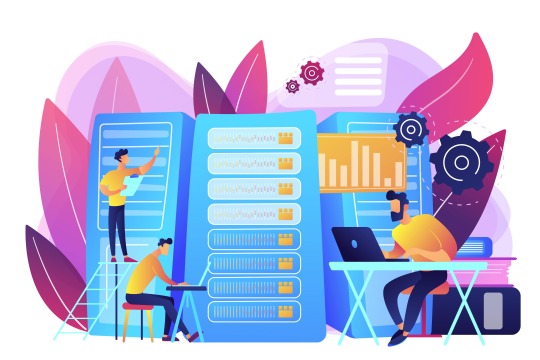
Why Businesses in India Choose SAP Business One ERP
SAP Business One ERP is designed to meet the unique challenges faced by Indian businesses. With its ability to manage financials, sales, customer relationships, and inventory in one integrated solution, SAP B1 enables businesses to achieve operational excellence. Here are some of the reasons why businesses in India are increasingly opting for SAP B1 ERP in India:
1. Cost-Effective ERP Solution
Unlike traditional ERP systems that require large-scale infrastructure and high upfront costs, ERP SAP B1 is an affordable solution that delivers enterprise-grade functionality to SMEs.
2. Comprehensive Business Integration
SAP Business One consolidates key business functions such as accounting, supply chain management, human resources, and sales, allowing seamless data flow and better collaboration between departments.
3. Regulatory Compliance and GST Integration
With India’s evolving tax regulations, businesses must ensure compliance with GST and other statutory requirements. SAP Business One ERP in India comes with built-in tax calculation features, making compliance effortless.
4. Scalability for Growing Businesses
As businesses expand, they require an ERP system that can grow with them. SAP Business One offers scalability, enabling organizations to add new users, functionalities, and locations with ease.
5. Cloud and On-Premise Deployment Options
Businesses can choose between cloud-based or on-premise deployment depending on their specific needs, offering flexibility and cost-effectiveness.
Key Features of ERP SAP Business One
SAP Business One is equipped with robust features that help businesses achieve digital transformation. Some of its key features include:
1. Financial Management
Automated financial processes
Real-time analytics and reporting
Multi-currency support
2. Sales and Customer Relationship Management (CRM)
Lead and opportunity tracking
Order processing automation
Customer data integration
3. Inventory and Supply Chain Management
Stock tracking and warehouse management
Demand forecasting and procurement planning
Real-time inventory visibility
4. Business Intelligence & Reporting
Customizable dashboards and reports
AI-driven insights for better decision-making
Integration with third-party analytics tools
5. Production and Project Management
Bill of materials (BOM) handling
Work order management
Project costing and resource planning
Enhancing ERP SAP Business One with SAP Business One Addon Solutions
While SAP B1 ERP in India offers a robust set of features, businesses often require additional customizations to cater to their specific industry needs. This is where SAP Business One Add-on solutions come into play. These add-ons extend the core functionalities of SAP B1, making it even more efficient for industry-specific applications.
Popular SAP Business One Addons
1. Manufacturing Addon
This addon enhances production planning and shop floor management, helping manufacturers streamline operations and reduce downtime.
2. Retail and POS Addon
Retail businesses can benefit from features like multi-store management, loyalty programs, and real-time sales tracking.
3. E-commerce Integration Addon
This addon allows seamless integration with platforms like Shopify, WooCommerce, and Magento, ensuring a smooth online sales process.
4. HR and Payroll Addon
For businesses that require advanced human resource management, this addon helps with employee records, payroll processing, and leave management.
5. Third-Party API Integration Addon
Businesses that rely on multiple applications can integrate third-party APIs with SAP Business One, ensuring seamless data synchronization.
Future Trends of SAP Business One ERP in India
As technology evolves, so does ERP SAP Business One. Here are some emerging trends in SAP Business One that will shape the future of ERP in India:
1. AI-Powered Automation
Artificial Intelligence (AI) and Machine Learning (ML) are transforming ERP systems by automating repetitive tasks, improving decision-making, and predicting market trends.
2. Internet of Things (IoT) Integration
IoT-enabled SAP Business One solutions provide real-time data on inventory, equipment performance, and logistics, optimizing operational efficiency.
3. Enhanced Cybersecurity Measures
With increasing cyber threats, SAP Business One is incorporating advanced security protocols to protect business-critical data.
4. Mobile ERP Solutions
Mobile access to ERP systems is becoming a necessity, allowing businesses to manage operations anytime, anywhere.
5. Cloud-Based SAP Business One Solutions
Cloud deployment is gaining popularity, providing cost-effective, scalable, and flexible ERP solutions for businesses of all sizes.
Conclusion
ERP SAP B1 has revolutionized the way businesses in India operate by offering a unified platform for financial management, inventory control, CRM, and more. With the growing demand for SAP Business One ERP in India, organizations are reaping the benefits of digital transformation and improved efficiency. Additionally, solutions provide businesses with tailored functionalities to meet their specific industry requirements.
As Indian businesses continue to grow and adapt to market changes, adopting SAP Business One ERP with the right add-ons will be key to staying competitive. If you are looking for a powerful ERP solution that can scale with your business, SAP Business One is the ideal choice.
Are you ready to take your business to the next level with SAP Business One? Get in touch with an authorized SAP partner today and explore how ERP SAP Business One can transform your business!
0 notes